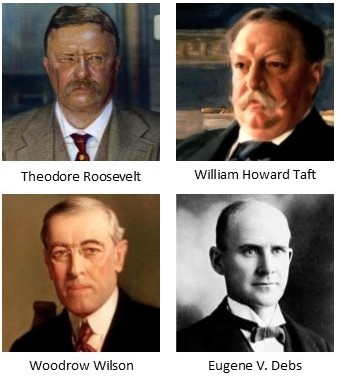 Realizing I knew more about conditions in Europe than in America in the early years of the 20th century I decided to examine the politics and political movements Americans were facing. The best place to find these critical issues was to look at the election of 1912.
Realizing I knew more about conditions in Europe than in America in the early years of the 20th century I decided to examine the politics and political movements Americans were facing. The best place to find these critical issues was to look at the election of 1912.
By November 1912 there were four candidates for president. One new political party sprang up that year, one reached its apex and finally fizzled out four years later, and the two established primary parties struggled in a bitter battle in 1912. Theodore Roosevelt was President of the United States from 1901 through 1909. When inaugurated at the beginning of his second term, he vowed to not run for a third term. His vice-president William Howard Taft served as president from 1909 through 1913. Both men were Republicans and close friends.
As the 1912 election season arrived, things somehow got very confusing and belligerent. Theodore (TR) Roosevelt returned home from an extensive journey through Africa and Europe. People loved him and wanted him back in the White House. Many approved of his progressive politics. Taft, on the other hand, did not enjoy the presidency. He wanted to serve in the Supreme Court which he later did. He was much more conservative than TR, leaning to high tariff protectionism for industry coupled with sound money based on the gold standard.
The National Republican Party in 1912 nominated William H. Taft as their candidate. Roosevelt and his followers quickly organized the Bull Moose Party favoring Progressive ideas such as moral improvement, reform of local government and big business. Women’s suffrage, labor unions, Pure Food Act, child labor laws and correcting injustice with the exception of lynching were strong points for TR.
Eugene Debs entered the race as the Socialist candidate. Debs would oppose World War I, was a strong labor organizer who believed workers should run the government and determine economic issues. Debs was a devout Socialist with ties to Russia.
In 1912 Woodrow Wilson served as governor of Virginia and became the first Southerner elected president from the south since the Civil War. A former president of Princeton University and Democrat, Wilson was an introvert with few friends and confidantes. His platform was New Freedom under which he proposed limited government, support for small farmers and small businessmen. He believed in reforming, not removing, tariffs, distrusted banks in general, and advocated antitrust action to break up monopolies.
Another group with no specific nominee in the campaign was Populists. They were primarily unhappy farmers with connections to both Democrats and Republicans. Populists believed in federal government control of railroads, telegraphs, and telephones. They wanted abolition of national banks, graduated income tax, direct election of Senators and Civil Service reform.
As you can tell, many of these issues have been resolved. We now vote directly for Senators and President. Women can vote and children no longer work in factories. Lynching is now a criminal offence. But other matters on this list are still in question. In 1912 the country was torn with dissent over the election. World War I was not a popular, but has there ever been a popular war? One of the great principals of this country is that everyone has a right to their own opinion. Remember that!
